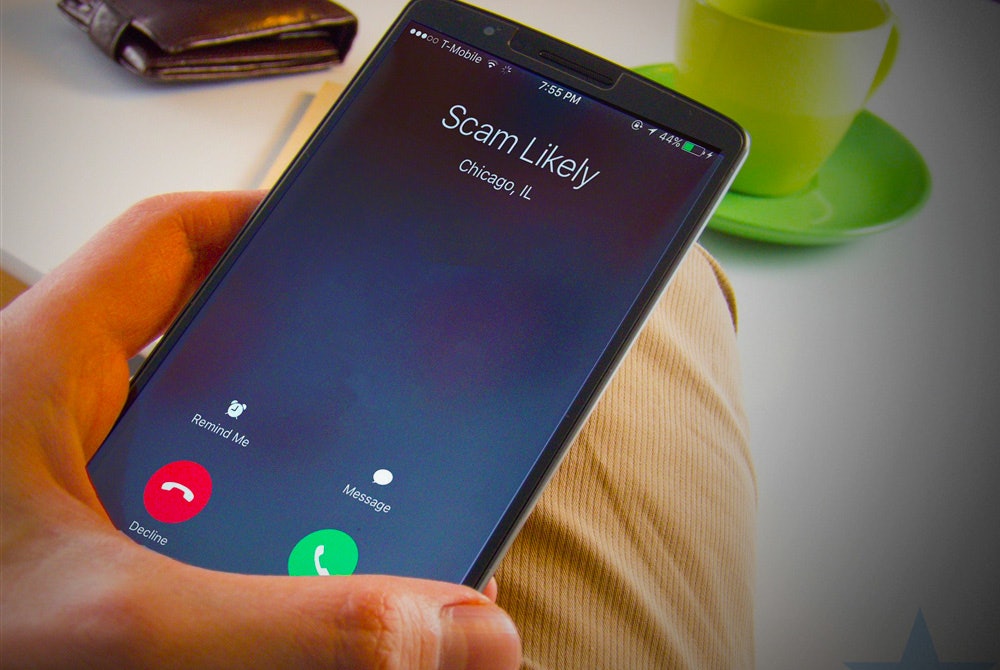- How Are Calls Classified as Scam Likely?
- Are All Of These Calls Scams?
- Are Robocalls Considered Scam Likely?
- How to Block “Scam Likely” Calls
- Reducing the Number of “Scam Likely” Calls
- Is it Safe to Answer “Scam Likely” Calls?
Nearly 1,900 robocalls are made every second. That adds up to 159 million robocalls every day and more than 4.6 billion calls a month. If you’re thinking these nuisance calls are getting worse, you’re right. Estimates are that there will be more than 51 billion robocalls by the end of 2021, representing an increase of more than 11% from last year.
To deal with this deluge of nuisance and scam calls, major cell carriers have implemented more aggressive screening methods and are labeling many robocalls and potential scams as “Scam Likely.” If you see "Scam Likely" show up on your phone, it’s a warning sign.
Phone numbers marked as "Scam Likely" are typically numbers that have been shown to originate a significant volume of robocalls or have been reported as being scams. These calls may be scams, robocalls, spoofed numbers, or calls originating from numbers tied to suspicious activity.
The Federal Communications Commission (FCC) required phone carriers to implement call verification technology as of July 1, 2021. Known as STIR/SHAKEN, it helps protect people from scams accounting for more than $10 billion annually.
How Are Calls Classified as Scam Likely?
Each of the major phone carriers has a list of numbers they have designated as "Scam Likely" callers based on history. While it’s not an exact science, calls generally are marked as "Scam Likely" if they meet one of these conditions:
- They generate a large volume of outbound calls each day
- The majority of calls made are robocalls
- The number has been reported as spam or a scam
- Outbound caller ID numbers have not been appropriately set within caller phone systems
Are All Of These Calls Scams?
Some legitimate calls get mistakenly labeled as “Scam Likely.” Algorithms developed to flag robocalls, or scam calls may not distinguish between legal and illegal robocalls. Not all robocalls are scams. Examples are school systems notifying parents of school closures or telemarketing calls to people who have opted to receive them.
In other cases, legitimate businesses that have had their number spoofed by scammers can also get tagged as "Scam Likely." However, anytime you see a caller ID that displays this, you should be wary. The best advice is to ignore the call or let it go to voicemail. This way, you can check it out before answering.
Are Robocalls Considered Scam Likely?
Not all robocalls are considered “Scam Likely,” but many of them are. Placing automated telemarketing calls (robocalls) to consumers without getting prior written permission is illegal in the U.S.
In 2020, Congress passed the Telephone Robocall Abuse Criminal Enforcement and Deterrence Act (TRACED Act), which was signed into law and significantly increased fines and enforcement powers. In September 2021, the FCC proposed a record $5.1 million fine for a group based on 1,100 calls.
Yet, the TRACED Act hasn’t stopped telemarketers and scammers from continuing the practice.
How to Block “Scam Likely” Calls
Most of the major phone carriers, including T-Mobile/Sprint, AT&T, Verizon, and Comcast, automatically verify all incoming and outgoing calls that are routed through their networks. These calls are flagged and labeled as “Scam Likely.”
While some calls will be blocked altogether, the carriers will label suspicious numbers as “Scam Likely.” If you want to prevent these numbers from calling again, you can block them.
On an Android smartphone, navigate to your list of recent calls and click on the icon next to the number. This will call up a submenu that lets you choose to block the number.
On an iPhone, go to your list of recent calls and click on the information icon (an "i" within a circle) next to the number you want to block. Next, scroll to the bottom of the options and click on "Block this Caller."
You can also add apps to your phone that will help reduce the number of scam calls and robocalls.
Reducing the Number of “Scam Likely” Calls
You can block these calls on your phone, but it can be tedious work if you get many of them because you have to block each one individually. Therefore, to reduce the number of “Scam Likely” calls you do get, you should:
- Ignore them. If you ignore these calls, robocall systems may put your number on the inactive list.
- Check with your phone carrier. Make sure your carrier detects robocalls and scam calls and takes proactive measures to reduce the number of calls that get through to your phone.
- Sign up for the Do Not Call Registry. The Do Not Call Registry is a free service offered by the Federal Trade Commission (FTC) that alerts legitimate companies that you do not wish to receive calls without prior consent.
- Report unwanted robocalls and “Scam Likely” calls. You can report scam calls to the FTC. The FTC updates its list of reported calls daily and releases them to phone companies.
- Install blocking apps. You can install free (and paid) app services on your phone to block additional calls. Each phone carrier and service may have different lists they use to block calls.
You can also set your phone to Do Not Disturb mode. For both Android and iOS phones, this will prevent all calls from ringing except for those on your contact lists. Calls will still go through to your voicemail.
Is it Safe to Answer “Scam Likely” Calls?
If a “Scam Likely” call shows up on your phone, ignore it. It can be tempting to answer the call and let the caller know you don’t appreciate unwanted phone calls but resist the urge. Answering the call lets those calling know the number is active and may increase the number of calls you get.
FCC AdviceDon't answer calls from unknown numbers. If you answer such a call, hang up immediately.
If you do answer a “Scam Likely” call and the robotic voice tells you to push a button to get put on the do not call list, don’t believe it. While it may be real, it may also be a way for robocallers to know they’ve reached somebody.


Comments